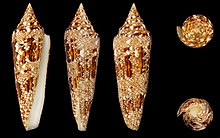Conus bengalensis
Appearance
| Conus bengalensis | |
|---|---|

| |
| Shell of Conus bengalensis (specimen at the Smithsonian Institution) | |
| Scientific classification | |
| Domain: | Eukaryota |
| Kingdom: | Animalia |
| Phylum: | Mollusca |
| Class: | Gastropoda |
| Subclass: | Caenogastropoda |
| Order: | Neogastropoda |
| Superfamily: | Conoidea |
| Family: | Conidae |
| Genus: | Conus |
| Species: | C. bengalensis
|
| Binomial name | |
| Conus bengalensis (Okutani, 1968)
| |
| Synonyms[2] | |
| |
Conus bengalensis, common name the Bengal cone, is a species of sea snail, a marine gastropod mollusk in the family Conidae, the cone snails and their allies.[2]
Like all species within the genus Conus, these snails are predatory and venomous. They are capable of "stinging" humans, therefore live ones should be handled carefully or not at all.
- Subspecies
- Conus bengalensis bengalensis (Okutani, 1968)
- Conus bengalensis robustus Tove, 2023
- Conus bengalensis sumbawaensis (Verbinnen, 2022): synonym of Conus sumbawaensis (Verbinnen, 2022) (superseded rank)
Description
[edit]The size of the shell varies between 60 mm and 148 mm.
This section needs expansion. You can help by adding to it. (July 2015) |
Distribution
[edit]This marine species occurs off the Bay of Bengal, the Andaman Sea, Burma and Thailand
References
[edit]- ^ Kohn, A. (2013). "Conus bengalensis". IUCN Red List of Threatened Species. 2013: e.T192738A2153075. doi:10.2305/IUCN.UK.2013-1.RLTS.T192738A2153075.en. Retrieved 22 April 2024.
- ^ a b Conus bengalensis (Okutani, 1968). Retrieved through: World Register of Marine Species on 27 March 2010.
- MacDonald & Co (1979). The MacDonald Encyclopedia of Shells. MacDonald & Co. London & Sydney.
- Röckel, D., Korn, W. & Kohn, A.J. (1995). A Manual of Living Conidae. Verlag Christa. Wiesbaden : Hemmen. 358 pp.
- Tove, M. (2023). Reassessment of the Indo-Pacific “Glory Cones”. Gloria Maris. 61(3): 135-143
External links
[edit]-
Conus bengalensis (Okutani, T.A., 1968)
-
Conus bengalensis (Okutani, T.A., 1968)
External links
[edit]- The Conus Biodiversity website
- Cone Shells – Knights of the Sea
- "Cylinder bengalensis". Gastropods.com. Retrieved 15 January 2019.



